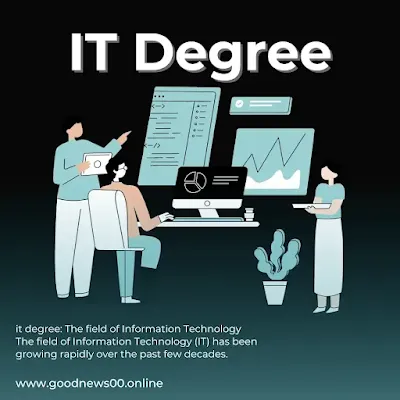IT degree: The field of Information Technology
Undergraduate program that focuses on the design
An IT degree is a four-year undergraduate program that focuses on the design, development, implementation, and management of computer-based information systems. The curriculum includes courses such as computer programming, database management, networking, web development, and cybersecurity.
The versatility it provides
One of the primary benefits of an IT degree is the versatility it provides. Graduates can pursue a variety of careers in different sectors such as healthcare, finance, education, government, and more. They can work as software developers, network administrators, database analysts, cybersecurity experts, and many other roles.
Professionals in the job market
Another advantage of an IT degree is the high demand for IT professionals in the job market. According to the Bureau of Labor Statistics (BLS), employment in the computer and information technology field is projected to grow 11% from 2019 to 2029, much faster than the average for all occupations. This growth is due to the increasing need for organizations to adopt new technologies and digital transformation.
Career versatility
In addition to job security and career versatility, an IT degree also offers a competitive salary. According to PayScale, the average salary for an IT professional with a bachelor's degree is around $70,000 per year. However, this can vary depending on the specific role, industry, and location.
Strong foundation in mathematics
To pursue an IT degree, students must have a strong foundation in mathematics, science, and computer skills. They must also possess analytical thinking, problem-solving skills, and attention to detail. Additionally, they should have excellent communication skills as they will be required to work with teams and clients.
Fundamental concepts of computer
The curriculum for an IT degree varies depending on the institution and program. However, most programs cover the fundamental concepts of computer science, programming, and information systems. Students will learn how to develop software applications, design databases, manage networks, and secure systems.
Critical courses programming
One of the critical courses in an IT degree program is programming. Students will learn how to code in different programming languages such as Java, Python, C++, and others. They will also learn how to develop software applications that meet specific requirements and solve real-world problems.
Database management
Another essential course in an IT degree program is database management. Students will learn how to design, implement, and manage databases using tools such as SQL and Oracle. They will also learn how to ensure data integrity, security, and accessibility.
Computer networks
Networking is another critical course in an IT degree program. Students will learn how to design and manage computer networks, including LANs, WANs, and wireless networks. They will also learn about network security, protocols, and troubleshooting.
Protect systems
Cybersecurity is also a crucial course in an IT degree program. Students will learn about the different types of cyber threats and attacks, including malware, phishing, and social engineering. They will also learn about security policies, procedures, and best practices to protect systems and data.
Excellent choice for students
In conclusion, an IT degree is an excellent choice for students who want to pursue a career in the technology industry. It provides them with a broad range of skills and knowledge necessary to succeed in different roles and sectors. Additionally, it offers job security, career versatility, and a competitive salary. With the increasing demand for IT professionals, pursuing an IT degree can lead to a promising and rewarding career.
Lead to exciting and innovative career
In addition, an IT degree can also lead to exciting and innovative career opportunities. From cybersecurity to software development, there is a wide range of specializations within the field that cater to different interests and skill sets. With the constant evolution of technology, IT professionals are constantly challenged to adapt and learn new skills, making for a dynamic and fulfilling career path. Pursuing an IT degree can provide a solid foundation for a successful and rewarding career in this ever-changing industry.
Offer a competitive salary
an IT degree can also offer a competitive salary and job security. According to the Bureau of Labor Statistics, the median annual wage for computer and information technology occupations was $88,240 as of May 2019, which is significantly higher than the median annual wage for all occupations. Additionally, the demand for IT professionals is expected to grow much faster than the average for all occupations, with a projected growth rate of 11% from 2019 to 2029.
Opportunities for entrepreneurship
an IT degree can provide opportunities for entrepreneurship and innovation. Many successful tech startups have been founded by individuals with a strong background in IT. With the right skills and knowledge, IT professionals can create their own products and services or work as consultants to help businesses and organizations improve their technology infrastructure.
Open up a world of possibilities
Pursuing an IT degree can open up a world of possibilities for individuals who are interested in technology and innovation. With the right education and training, IT professionals can enjoy a rewarding career with excellent job prospects, high earning potential, and opportunities for entrepreneurship and creativity.


Comments
Post a Comment